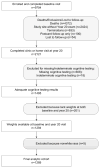Weight Trajectory over 20 Years and Likelihood of Mild Cognitive Impairment or Dementia Among Older Women
- PMID: 27991654
- PMCID: PMC5685172
- DOI: 10.1111/jgs.14552
Weight Trajectory over 20 Years and Likelihood of Mild Cognitive Impairment or Dementia Among Older Women
Abstract
Objectives: The association between weight change and cognition is controversial. We examined the association between 20-year weight change and cognitive function in late life.
Design: Cohort study.
Setting: Study of Osteoporotic Fractures (SOF).
Participants: One thousand two hundred eighty-nine older, community-dwelling women (mean baseline age 68 (65-81) and 88 (82-102) at cognitive testing).
Measurements: Study of Osteoporotic Fractures participants had body weight measured repeatedly over 20 years (mean 8 weights). Adjudicated cognitive status was classified as normal (n = 775) or mild cognitive impairment (MCI)/dementia (n = 514) at Year 20. Logistic models were used to evaluate whether absolute weight change, rate of weight loss per year, presence of abrupt, unrecovered weight loss, and weight variability were associated with MCI or dementia.
Results: Women with greater rate of weight loss over 20 years had increased chance of developing MCI or dementia. In age/education/clinic-adjusted "base" models, each 0.5 kg/yr decrease resulted in 30% increased odds of MCI/dementia (OR = 1.30 [95% CI: 1.14, 1.49]). After adjustment for age, education, clinic, depression, and walking speed, there was 17% (OR = 1.17 [95% CI: 1.02, 1.35]) increased odds of MCI/dementia for each 0.5 kg/yr decrease in weight. In base models, variability in weight was significant. Each 1% average deviation from each woman's predicted weight curve was associated with 11% increased odds of MCI/dementia (OR = 1.11 [95% CI: 1.04, 1.18]). The estimate was attenuated after full adjustment (OR = 1.06 [95% CI: 0.99, 1.14]). The presence of an abrupt weight decline was not associated with MCI/dementia.
Conclusions: Rate of weight loss over 20 years was associated with development of MCI or dementia in women surviving past 80 years, suggesting that nutritional status, social-environmental factors, and/or adipose tissue function and structure may affect cognitive function with aging.
Keywords: cognitive dysfunction; dementia; weight trajectory.
© 2016, Copyright the Authors Journal compilation © 2016, The American Geriatrics Society.
Similar articles
-
Decline in Weight and Incident Mild Cognitive Impairment: Mayo Clinic Study of Aging.JAMA Neurol. 2016 Apr;73(4):439-46. doi: 10.1001/jamaneurol.2015.4756. JAMA Neurol. 2016. PMID: 26831542 Free PMC article.
-
Correlates of Dementia and Mild Cognitive Impairment in Patients With Atrial Fibrillation: The Atherosclerosis Risk in Communities Neurocognitive Study (ARIC-NCS).J Am Heart Assoc. 2017 Jul 24;6(7):e006014. doi: 10.1161/JAHA.117.006014. J Am Heart Assoc. 2017. PMID: 28739861 Free PMC article.
-
Circadian activity rhythms and risk of incident dementia and mild cognitive impairment in older women.Ann Neurol. 2011 Nov;70(5):722-32. doi: 10.1002/ana.22468. Ann Neurol. 2011. PMID: 22162057 Free PMC article.
-
Body mass index and mild cognitive impairment-to-dementia progression in 24 months: a prospective study.Eur J Clin Nutr. 2014 Nov;68(11):1216-9. doi: 10.1038/ejcn.2014.167. Epub 2014 Aug 13. Eur J Clin Nutr. 2014. PMID: 25117990 Review.
-
Impact of dementia and mild cognitive impairment on bone health in older people.Aging Clin Exp Res. 2024 Dec 27;37(1):5. doi: 10.1007/s40520-024-02871-y. Aging Clin Exp Res. 2024. PMID: 39725855 Free PMC article. Review.
Cited by
-
PROtein enriched MEDiterranean diet to combat undernutrition and promote healthy neuroCOGnitive ageing in older adults: The PROMED-COG consortium project.Nutr Bull. 2022 Sep;47(3):356-365. doi: 10.1111/nbu.12571. Epub 2022 Jul 20. Nutr Bull. 2022. PMID: 36045102 Free PMC article.
-
Obesity and Longer Term Risks of Dementia in 65-74 Year Olds.Age Ageing. 2019 May 1;48(3):367-373. doi: 10.1093/ageing/afz002. Age Ageing. 2019. PMID: 30726871 Free PMC article.
-
Variability in metabolic parameters and risk of dementia: a nationwide population-based study.Alzheimers Res Ther. 2018 Oct 27;10(1):110. doi: 10.1186/s13195-018-0442-3. Alzheimers Res Ther. 2018. PMID: 30368247 Free PMC article.
-
Long-term Weight Change and its Temporal Relation to Later-life Dementia in the Health and Retirement Study.J Clin Endocrinol Metab. 2022 Jun 16;107(7):e2710-e2716. doi: 10.1210/clinem/dgac229. J Clin Endocrinol Metab. 2022. PMID: 35420682 Free PMC article.
-
Association of midlife body-weight variability and cycles with earlier dementia onset: a nationwide cohort study.Alzheimers Res Ther. 2024 Apr 25;16(1):91. doi: 10.1186/s13195-024-01460-5. Alzheimers Res Ther. 2024. PMID: 38664832 Free PMC article.
References
-
- Stewart R, Masaki K, Xue QL, Peila R, Petrovitch H, White LR, Launer LJ. A 32-year prospective study of change in body weight and incident dementia: the Honolulu-Asia Aging Study. Arch Neurol. 2005;62(1):55–60. - PubMed
-
- Buchman AS, Wilson RS, Bienias JL, Shah RC, Evans DA, Bennett DA. Change in body mass index and risk of incident Alzheimer disease. Neurology. 2005;65(6):892–897. - PubMed
-
- Nourhashemi F, Deschamps V, Larrieu S, Letenneur L, Dartigues JF, Barberger-Gateau P. Body mass index and incidence of dementia: the PAQUID study. Neurology. 2003;60(1):117–119. - PubMed
MeSH terms
Grants and funding
LinkOut - more resources
Full Text Sources
Other Literature Sources
Medical
Miscellaneous


